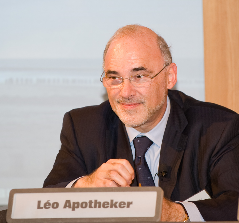SAP's Apotheker: 'Happy John Wookey joined us'; Business hasn't gotten worse

SAP co-CEO Leo Apotheker said Friday that John Wookey, a former Oracle executive, is "a great software man" who will help the enterprise software giant push its software as a service meets on-premise applications strategy. Separately, Apotheker noted that business hasn't gotten worse from the outlook the company gave on Oct. 28. While that outlook is vague it could count as a small victory since demand hasn't unraveled in the last three weeks or so.
Speaking at a talk at SAP's offices in New York City, Apotheker (right, credit: SAP) outlined how its SaaS suite--BusinessByDesign--will play with its traditional enterprise resource planning software. His take: Some customers will choose to do some things as a service and keep on premise apps for core competencies.
Wookey--he started last Tuesday--will be the front man for SAP's vision. Wookey will be in charge of SAP's on-demand effort. Word of Wookey's move to SAP surfaced Nov. 11. When asked about Wookey's master plan, Apotheker said that it made sense for his new hire to get a couple of weeks under his belt at SAP.
"What we can do is to combine the two worlds, there are certain things you can't run in the cloud because it can collapse. No consumer company is going to run billing for 50 million customers in the cloud. It doesn't make sense," said Apotheker. "We're giving people the opportunity to run the two things together. Try to give everyone a choice. People will do what they always do. They'll do return on capital and what makes more sense."
With that message Apotheker paints a realistic view of how BusinessByDemand and its other apps will play together. Apotheker said that companies need to resist becoming hypnotized by any one approach. He mentioned Compaq as an example of what can happen. Compaq outsourced its manufacturing, design and "wound up just being a logo."
Apotheker was speaking at a powwow focused on how companies should invest in IT into a downturn for competitive advantage. SAP had a panel of customers including Naomi Wyatt, secretary of administration for the Commonwealth of Pennsylvania; Partha Biswas, CIO of Joerns Healthcare; and Andrew McAfee, Harvard Business School professor. Bill Richardson, an analyst at AMR Research, moderated the panel.
The panel was definitely part infomercial. Of course, SAP would want folks to invest in their enterprise apps into a downturn. And in the grand scheme of things Apotheker's pitch is on target--assuming companies can get a return and have the capital lying around.
SAP's customers on the panel all had success stories to tell, but the general theme was that they were able to implement quickly. That's a big message if you're going to get folks to invest in a recession.
Apotheker was asked about when the economy would improve and he noted that "I'm not a prophet." He indicated that it's unclear how long it will take for the credit crunch to heal, but Apotheker was comforted by the global government response. He was also asked about discounting. Apotheker danced around the question and said SAP is a long-term partner to customers.
Apotheker noted:
"2009 will be a tough year. For the majority of companies trying to make higher topline will be very difficult. And if you're struggling on the topline you need to gain as much insight and spend as less money as possible," said Apotheker. The subtext: Improve your processes (and naturally buy some SAP).
Among other topics:
- SAP is offering zero percent financing to midsize companies in the first year.
- Apotheker noted that he thought CIOs have finally achieved that business alignment goal that has been so elusive for years.
- Wyatt said the state of Pennsylvania is deploying BusinessObjects in 2009 and business intelligence is the biggest priority. After all, Pennsylvania, like most states, is in a financial pickle. She noted that her implementation of SAP was codenamed Imagine PA, but had the nickname Imagine PAin. Aside from that quip, Wyatt said that the project went well.
- SAP may be angling for some banking customers. Apotheker noted that financial services firms have a rat's nest of applications that can be combined in addition to improving processes. Indeed, all of these mergers--Bank of America-Merrill Lynch-Countrywide; J.P. Morgan Chase-Washington Mutual-Bear Stearns; Wells Fargo-Wachovia--ultimately will mean a lot of systems integration. My hunch: Once the shot-gun mergers end, SAP may look to become a stronger player in the financial vertical.
Also see: SAP pulls its outlook ‘in light of the uncertainties’
